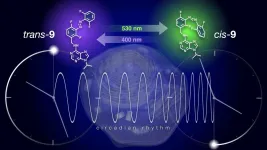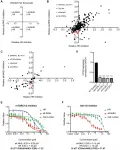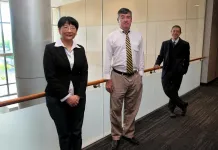(Press-News.org) The biological clock is present in almost all cells of an organism. As more and more evidence emerges that clocks in certain organs could be out of sync, there is a need to investigate and reset these clocks locally. Scientists from the Netherlands and Japan introduced a light-controlled on/off switch to a kinase inhibitor, which affects clock function. This gives them control of the biological clock in cultured cells and explanted tissue. They published their results on 26 May in Nature Communications.
Life on Earth has evolved under a 24-hour cycle; of light and dark, hot and cold. 'As a result, our cells are synchronized to these 24-hour oscillations,' says Wiktor Szymanski, Professor of Radiological Chemistry at the University Medical Center Groningen. Our circadian clock is regulated by a central controller in the suprachiasmatic nucleus, a region in the brain directly above the optic nerve, but all our cells contain a clock of their own. These clocks consist of an oscillation in the production and breakdown of certain proteins.
Light switch
'It is becoming increasingly clear that these clocks can be disrupted in organs or tissues, which may lead to disease,' adds first author Dušan Kolarski, a PhD student from the group led by Ben Feringa, Professor of Organic Chemistry. And, of course, we all know about jet lag, which is caused by travel across time zones, or problems that are caused by the switch to or from daylight saving time. 'We know very little about how our cells coordinate these oscillations, or how it affects the body if, for example, one kidney is out of phase with the rest of the body,' he adds.
To study these effects, it would be useful to have a drug that affects the clocks and that can be activated locally. The latter is something that the groups of Szymanski and Feringa have done before. They created several compounds, such as antibiotics or anticancer drugs, that could be switched on and off with light. Previously, circadian biologist Tsuyoshi Hirota, associate professor at the Institute of Transformative Bio-Molecules at Nagoya University, Japan, developed a kinase inhibitor, longdaysin, which slows down the circadian clock to a cycle that lasts up to 48 hours. Kolarski fitted this longdaysin with a light switch that allowed him to activate or deactivate the compound with violet and green light, respectively.
Time zone
Developing this adaptation took Kolarski several years, but the result was well worth the effort. 'It was a real scientific "Tour de Force" and a beautiful example of interdisciplinary cooperation', adds Feringa. Together with their Japanese colleagues at Nagoya University, the scientists from the University of Groningen showed how the cycle of cultured cells was extended from 24 to 28 hours by treatment with the longdaysin derivative. Deactivation with green light brought the cycle back to just over 25 hours and subsequent reactivation with violet light returned it to 28 hours. 'We also used it in tissue slices from the mouse suprachiasmatic nucleus,' says Kolarski. 'The oscillations slowed to a 26-hour cycle after treatment for several days with the longdaysin derivative and returned to a 24-hour cycle after deactivation with green light.' 'This reversible regulation will provide a new approach to analysing how the clock in each cell is organized at the tissue level to gain a deeper understanding of the complex circadian clock system,' Hirota adds.
The scientists also adjusted the phase of the cycles in cultured cells: a three-day activation of the longdaysin derivative followed by deactivation caused a shift in the 24-hour cycle by up to six hours. This is as if the cells were synchronized with a different time zone. The experiments are a proof of principle and will allow scientists to study the circadian clock in much more detail. A next step would be to use longdaysin in animals. Kolarski: 'The original longdaysin, without the switch, has been used before in zebrafish. We would very much like to test it in mice. The aim is not to fix jet lag but to study the effect of longdaysin on physiology.'
Organs
A light-activated drug such as longdaysin will probably only be used to treat serious conditions. 'We can actually reach quite a few organs with light, for example with an endoscope. The gastrointestinal tract and the respiratory system are easily reached, while other tissues may require small incisions to insert optic fibres,' comments Szymanski. There are also several emerging options to generate light inside organs or tissues, through techniques such as bioluminescence or sonoluminescence. Although these levels of light are still several orders of magnitude below what we need to flick a switch. We will work hard to increase sensitivity in the coming years, emphasize both Szymanski and Feringa. Kolarski adds: 'We have now opened a new field of study. Eventually, all this will allow us to locally disrupt or repair the circadian oscillations.'
Simple Science Summary
The cells in our body follow a 24-hour cycle, the circadian clock. Disruptions of this cycle, for example by working night shifts, can cause disease. In recent years, it has become clear that the clock can be disrupted in individual organs or tissues. To study and potentially cure problems with the clocks inside our cells, Dutch and Japanese scientists created a compound that will elongate the 24-hour cycle and that can be activated or deactivated using light. They showed that it is possible to change the 24-hour cycle in cells or tissues to a 28-hour cycle by activating the compound. After deactivation, the cells and tissues returned to a near-normal cycle. The compound can be used to investigate the clocks inside our cells and may eventually be used to treat diseases that are caused by a disrupted clock.
INFORMATION:
Reference: Dušan Kolarski, Carla Miró Vinyals, Akiko Sugiyama, Ashutosh Srivastava, Daisuke Ono, Yoshiko Nagai, Mui Iida, Kenichiro Itami, Florence Tama, Wiktor Szymanski, Tsuyoshi Hirota and Ben L. Feringa: Reversible modulation of circadian time with chronophotopharmacology. Nature Communications, 26 May 2021
CLEVELAND, Ohio (May 26, 2021)--Carpal tunnel syndrome (CTS), which causes tingling and numbness in the hand, more commonly affects women than men and tends to peak around the age of menopause. A new study suggests the risk of severe CTS increases in women who underwent bilateral oophorectomy before menopause, and estrogen therapy didn't provide a protective effect. Study results are published online today in Menopause, the journal of The North American Menopause Society (NAMS).
Carpal tunnel syndrome is the most common nerve disorder in the upper body. Although predominately idiopathic in nature, an association with sex hormones has been suggested because of a higher incidence in women ...
Oncotarget published "Creation of a new class of radiosensitizers for glioblastoma based on the mibefradil pharmacophore" which reported that this group previously identified a calcium channel blocker, mibefradil, as a potential GBM radiosensitizer. They discovered that mibefradil selectively inhibits a key DNA repair pathway, alternative non-homologous end joining.
Then, they initiated a phase I clinical trial that revealed promising initial efficacy of mibefradil, but further development was hampered by dose-limiting toxicities, including CCB-related cardiotoxicity, off-target hERG channel and cytochrome P450 enzymes interactions.
Here, the authors show that mibefradil inhibits ...
Even among a large group of cancer survivors who were mostly insured, college educated and had annual incomes above the national average, up to 10% delayed care in the previous 12 months because they simply could not afford out of pocket expenses like copays and deductibles, investigators report.
Being unable to get time off from work and being "nervous" about seeing a health care provider, were among the other frequently cited reasons for not always getting timely survivorship care, investigators at the Medical College of Georgia and Georgia Cancer Center report in the journal Cancer Medicine.
Investigators analyzed data from 5,426 cancer survivors who volunteered to share their information with the National Institutes of Health's All of Us Research Program, a historic effort ...
The pandemic has increased older adults' willingness to receive the flu shot, new research shows.
The study analyzed survey results of 4,501 Canadians over the age of 50 from ten provinces.
Twenty per cent of 1,001 research participants aged 50 to 64 indicated they had not considered getting a flu shot, but were now more likely to given the impact of COVID-19. Of these respondents, 92 per cent inducated that they had not been vaccinated against influenza the year before.
Of the 3,500 participants aged 65 and older, eight per cent reported that they had not originally planned to get a flu shot but were now more likely to receive it.
"The pandemic has been ...
A hidden planetary crisis has long been neglected that is as serious as the disappearance of species and degradation of habitats. Genetic diversity, which reflects the variation in DNA within species and populations and is the key to their capacity to adapt in times of change, is being lost at an alarming rate. According to an article by 28 authors representing 16 countries, the loss of genetic diversity can affect resiliency in the face of environmental change and result in the loss of important services provided to society. Once gone, genetic diversity can take millennia to return. ...
A new study by Cardiff University in collaboration with the University of Hertfordshire has revealed the huge "secondary burden" placed on those closest to people living with Long Covid.
The researchers surveyed more than 700 Covid-19 survivors along with their partners and close relatives to understand for the first time the impact of the disease on families as a whole.
The findings, published today in BMJ Open, suggest family quality of life is being "severely affected" and a major system of support is needed for both survivors - and those closest to them.
Survivors and their families spoke ...
Clots in the arteries (arterial thrombosis) are the most common cause of stroke (ischaemic stroke) and have been reported in detail for the first time in young adults who received the Oxford-AstraZeneca covid-19 vaccine in a letter from UK stroke specialists published online in Journal of Neurology Neurosurgery & Psychiatry.
While rare cases of blood clots have been reported previously after administration of the Oxford-AstraZeneca covid-19 vaccine, these have affected veins and most specifically veins in the brain (cerebral venous sinuses).
People who have experienced this unusual form of stroke (cerebral venous sinus thrombosis) have also had low platelet ...
Up to a third of patients taking methotrexate - a common treatment for immune mediated inflammatory conditions such as rheumatoid arthritis and psoriasis/psoriatic arthritis - failed to achieve an adequate immune response to mRNA COVID-19 vaccines in a small study accepted for publication in the journal Annals of Rheumatic Diseases.
While mRNA COVID-19 vaccines have been shown to produce an effective immune response in over 90% of healthy adults in clinical trials, it is unknown whether the immune response is as robust in patients with immune-mediated inflammatory diseases (IMID) who may also be taking immunomodulatory medications.
The authors assessed the immune response to the mRNA Pfizer-BioNTech COVID-19 vaccine in 82 patients ...
First-born children have a lower risk of cardiovascular events such as heart attacks and strokes than brothers and sisters born later, but people who are part of a large family with many siblings have an increased risk of these events, suggests the results of a large population study in Sweden, published in the online journal BMJ Open.
It is well-known that family history - the health of parents and grandparents - has an impact on a person's health, including their risk of cardiovascular events, but now there is growing interest in what influence the make-up of a person's immediate family - the number and age of siblings - might have.
The authors accessed data on 1.36 million men and 1.32 million women born between 1932 and 1960 and aged 30-58 years in ...
While some studies suggest female patients treated by female physicians have better outcomes, there does not appear to be a relationship between operator and patient gender and outcome in patients undergoing coronary angioplasty or stenting. These are the results of a first-of-its-kind study by the Blue Cross Blue Shield of Michigan Cardiovascular Consortium (BMC2) and published in Catheterizations and Cardiovascular Interventions.
The study looked at procedures performed by 385 male interventional cardiologists, and 18 female interventional cardiologists at 48 non-federal hospitals across the state of Michigan. Female interventional cardiologists continue to be markedly under-represented and only perform a small percentage of cases, with women accounting for ...



